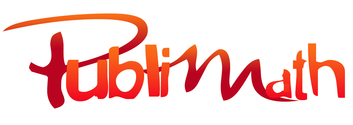Enseignement des premières notions de topologie à l’université – Une étude de cas.
English Title : Teaching basic concepts of topology at university level: a study case.
Auteur : Bridoux Stéphanie
Résumé
Ce travail de thèse trouve son origine dans un constat d’échec ressenti durant plusieurs années concernant un enseignement de topologie dans lequel nous prenons une part active, en première année d’université. L’auteure s’est donc donnée comme objectif de développer des pistes d’enrichissement, voire de modifications, de cet enseignement pouvant mener aux acquisitions visées tout en s’inscrivant dans les contraintes institutionnelles qui le délimitent strictement. A partir d’une étude épistémologique de la genèse et du développement de plusieurs notions de topologie, elle a pu caractériser leurs aspects formalisateur, unificateur et généralisateur. Cette étude, complétée par une analyse comparative de quelques manuels, a contribué à l’élaboration d’un scénario d’enseignement intégrant un certain nombre de leviers didactiques susceptibles de favoriser les apprentissages en topologie des étudiants, en tenant compte toutefois des contraintes déjà signalées. En se plaçant dans le cadre théorique de la théorie de l’activité spécifiée aux mathématiques, elle a explicité la description de son scénario en termes de tâches et d’activités attendues chez les étudiants, avant de l’expérimenter dans sa classe. Les analyses des déroulements en classe associées à celles des productions des étudiants aux différentes évaluations ont permis d’approcher les apprentissages en topologie effectivement réalisés par les étudiants, en relation avec la nature des tâches. Une diminution significative des échecs dans les tâches de manipulation des définitions a été observée. Cependant, il manque aux étudiants une certaine disponibilité des notions de topologie dans les tâches plus complexes qu’elle a pu associer à son scénario. Cette recherche met en évidence l’apport des analyses didactiques menées en amont de l’enseignement dans un travail de type ingénierie pour mieux appréhender ce que leur enseignement doit apporter aux étudiants. Elle pointe également toute l’importance de l’inscription des contraintes institutionnelles dans l’élaboration et l’expérimentation d’un scénario d’enseignement. C’est en mettant en relation ces deux dimensions et les progrès réels mais limités des étudiants que nous avons été en mesure d’apprécier la portée du scénario et d’envisager des alternatives mettant cette fois en cause le curriculum. Abstract This research started with a failure observation in our classroom since several years concerning a topology teaching at first year of university. To improve our understanding of the causes, we tackled the characters of topology concepts and their specificities in our teaching. Our first analysis (Bridoux, 2005) emphasized the formalizing, unifying and generelazing characters of those concepts in relation with the important distance between the topology concepts and the previous knowledge of students (Robert, 1998). This study also revealed that first topology exercises as using concepts définitions require complex adaptations of previous knowledge that are source of difficulties for a large number of students at this teaching level. That is why our research aims to improve the describing teaching, maybe modify it, to achieve the topology knowledge delimited by the institution and the associated constraints. An epistemological study of the genesis and the development of topological concepts allowed us to clarify the characters of concepts, their function and their specificities. Some of them have been introduced as tools to solve problems about functions but they are too complex for first year university students. However this study completed by an analysis of textbooks led us to build a teaching scenario based on a part of previous work. The scenario integrated didactical tracks to improve our topology teaching and the institutional constraints. The choosed theorical framework is theory of activity specified to mathematics (Vandebrouck and al., 2008). The main idea is that students activities in classroom, organised by teachers, contribute to mathematical acquisitions. Thus we described our scenario in terms of tasks and expected activities from students. The analysis of sequences in the classroom and students productions have shown a significant failure reduction for the manipulation of concepts definitions and the associated technical aspects. However we observed a lack of availability with more complex tasks that are in relationship with the built scenario. Indeed it does not take into account the tool dimension of topological concepts because of die institutional constraints that delimited the teaching. This research reveals me contribution of didactical analyses that precede an engeenering work. They enrich our understanding of the teaching concepts. Our work points also the major role of the institutional constraints to build and experiment a teaching scenario.
Notes
Une version texte intégral est en téléchargement sur le site https://hal.science/tel-00660249
Données de publication
Éditeur IREM de Paris, Université Denis Diderot Paris , 2011 Collection Thèses Format A4, 328 p. Index Bibliogr. p. 322-328
Public visé enseignant Niveau licence Âge 18
Type thèse Didactique des mathématiques, Paris, 2011 Langue français Support papier
Classification
